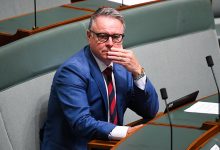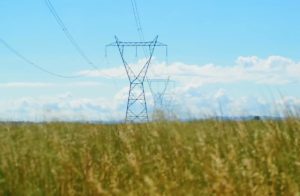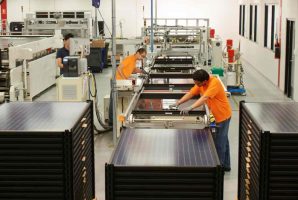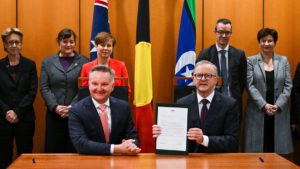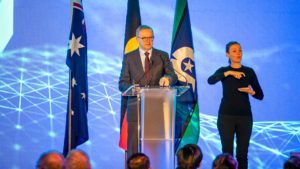The announcement of Joel Fitzgibbon’s impending departure from federal politics is likely to be quietly welcomed by his federal Labor colleagues, with the opposition party now set free to take up the fight with the Morrison government over Australia’s climate policies.
Fitzgibbon announced on Monday that he would not recontest his seat at the next federal election. Fitzgibbon has held the regional seat of Hunter for the last 25 years, serving as the defence minister during the Rudd government.
In recent years, Fitzgibbon had established himself as the primary opponent to stronger climate change policies within the Labor caucus – motivated mainly by what he saw as a need to preserve his own hold on a coal-heavy electorate.
Fitzgibbon told ABC’s Radio National that he felt that he had succeeded in bringing the federal Labor party back to the “centre-ground” in politics and convinced leader Anthony Albanese to back the fossil fuel industry.
“Anthony Albanese and I have worked very closely together for the last two and a half years, as you know, and as your listeners know, I’ve urged him back to the centre-ground,” Fitzgibbon told the ABC.
“I’ve urged him to focus on the things that are really important to working people. He’s been to a coal mine. He’s expressed support for the coal mining industry and the gas sector.”
Fitzgibbon’s departure hasn’t come as much of a surprise – with the former frontbencher effectively on the outer of his own party – often being the instigator of heated clashes within the federal Labor caucus over issues of climate and energy policy.
Coinciding with Fitzgibbon announcing his retirement from politics, an opinion piece published by Albanese in The Australian stresses that federal Labor will follow the footsteps of the Biden administration in the US on climate policy, saying that it would form a key part of Australia’s diplomatic relations with its most prominent ally.
“Australia’s action on climate change will shape whether our interests prosper in partnership with our neighbours and our US ally. On coming to office, I will make comprehensive US-Australia co-operation on climate change a hallmark of our alliance,” Albanese wrote.
The Biden Administration has reignited the United States’ efforts on climate change, including re-joining the Paris Agreement, committing to a net-zero emissions target for 2050, and launching a major diplomatic campaign to push other countries – including Australia – to boost their own climate efforts.
Ahead of the next federal election, Labor will be looking to articulate its revised policy platform on climate and energy, which is likely to include a commitment to an interim emissions reduction target for 2035 or 2040, as well as measures to boost the uptake of renewables, electric vehicles and green manufacturing.
At recent elections, Labor has generally sought to position its climate and energy policies as a meaningful alternative to the Coalition’s active antagonism to global climate change efforts – but Fitzgibbon has been an outspoken critic of such a stance, arguing that Labor would be electorally more successful if it were to align itself more closely with the fossil fuel friendly stance of the Morrison government.
Indeed, Fitzgibbon appeared to be closer to fossil fuel friendly counterparts within the Liberal-National Coalition than he was with many within his own party and openly advocated for Labor to merely adopt the policies of the Morrison government.
Recently, this included calling in Labor to back the controversial plans of federal energy minister Angus Taylor to open up clean energy funding bodies, including the Australian Renewable Energy Agency, to fund carbon capture and storage projects – saying it was “ideological craziness” to oppose Taylor’s plan.
Fitzgibbon’s embrace of the Coalition’s views on climate and energy included attending football matches sponsored by the NSW Minerals Council with the likes of John Barilaro and Mark Latham. Fitzgibbon was actively being courted by Nationals MPs including Matt Canavan and Keith Pitt to defect.
Fitzgibbon resigned from the Labor shadow cabinet in late 2020 – stepping down from the position of shadow minister for agriculture and resources – so that he could directly criticise his party’s climate policies.
The very public opposition expressed by Fitzgibbon ultimately led to the then Left-faction aligned shadow climate and energy minister Mark Butler being replaced by right-faction aligned Chris Bowen.
Fitzgibbon also convinced Labor to abandon the party’s 2030 emissions reduction target – to cut emissions by 45 per cent – that it took to the 2019 election. Fitzgibbon blamed Labor’s comparatively more ambitious climate change policies for its unexpected election loss in 2019.
Fitzgibbon has held the electorate of Hunter – centred around the coal hubs of Singleton, Muswellbrook and Cessnock – for the past 25 years. Fitzgibbon’s father, Eric, held the seat for the 12 years prior.
Fitzgibbon suffered a 14 per cent collapse in his primary vote at the 2019 federal election and only narrowly saw off a challenge from the National party to retain the seat.
While Fitzgibbon’s departure will make it very difficult for Labor to retain the seat at the next election, it will allow the party to adopt a more comprehensive climate policy platform that will help it see off challenges to inner-city seats being launched by the Greens and other progressive independents.

